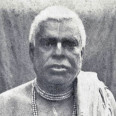Continuing our presentation of the upcoming release Sharanagati, in this song Srila Bhakti Vinod Thakur describes the surrendered soul’s submission to the Lord’s will.
Sharanagati
Song Twenty One
tumi sarveśvareśvara, vrajendra-kumāra!
tomāra ichchhāya viśve sṛjana saṁhāra [1]
tumi–You; sarveśvareśvara–the Lord of all Lords; vrajendra–of the king of Vraja; kumāra–the son, Krishna; tomāra–Your; ichchhāya–by the will; viśve–in the universe; sṛjana–creation; saṁhāra–annihilation. [1]
(1) You are the Lord of all Lords, O Vrajendra Kumar! In accordance with Your will, creation and annihilation take place within the universe.
Sri Laghu-chandrika-bhashya
(1) tumi sarveśvareśvara: “You are the Lord of all Lords.” The supreme position and identity of Krishna is described throughout the scriptures:
ete chāṁśa-kalāḥ puṁsaḥ kṛṣṇas tu bhagavān svayam
indrāri-vyākulaṁ lokaṁ mṛḍayanti yuge yuge
(Srimad Bhagavatam: 1.3.28)
“All these Avatars are manifestations or partial manifestations of the Purush-avatars but Krishna is Svayam Bhagavan, the Supreme Personality of Godhead. In every age these Avatars protect the demon-ridden universe.”
sṛjāmi tan-niyukto ’haṁ haro harati tad-vaśaḥ
viśvaṁ puruṣa-rūpeṇa paripāti tri-śakti-dhṛk
(Srimad Bhagavatam: 2.6.32)
“In accordance with the order of Sri Hari, I create the universe and Shiva annihilates it. Sri Hari, the controller of the three modes of material nature, maintains the universe with His form of Ksirodakshayi Vishnu.”
īśvaraḥ paramaḥ kṛṣṇaḥ sach-chid-ānanda-vigrahaḥ
anādir ādir govindaḥ sarva-kāraṇa-kāraṇam
(Sri Brahma-samhita: 5.1)
“The embodiment of spiritual existence, consciousness, and ecstasy, Sri Krishna, who is known as Govinda, is the Supreme Lord of all Lords. He has no origin, He is the origin of all, and He is the cause of all causes.”
ahaṁ sarvasya prabhavo mattaḥ sarvaṁ pravartate
iti matvā bhajante māṁ budhā bhāva-samanvitāḥ
(Srimad Bhagavad-gita: 10.8)
[Krishna Himself explains:] “I am the origin of everything. Everything emanates from Me. Realising this, the wise serve Me, fully imbued with divine love.”
mattaḥ parataraṁ nānyat kiñchid asti dhanañjaya
mayi sarvam idaṁ protaṁ sūtre maṇi-gaṇā iva
(Srimad Bhagavad-gita: 7.7)
“O Arjun, there is nothing superior to Me. All that exists is strung upon Me like jewels upon a thread.”
tava ichchhā-mata brahmā karena sṛjana
tava ichchhā-mata viṣṇu karena pālana [2]
tava–Your; ichchhā–will; mata–according to; brahmā–the universal creator; karena–does; sṛjana–creation; tava–Your; ichchhā–will; mata–according to; viṣṇu–the maintainer of the material nature; karena–does; pālana–maintenance. [2]
(2) In accordance with Your will, Brahma creates the universe. In accordance with Your will, Vishnu maintains the universe.
tava ichchhā-mata śiva karena saṁhāra
tava ichchhā-mate māyā sṛje kārāgāra [3]
tava–Your; ichchhā–will; mata–according to; śiva–the topmost Vaishnav who serves Krishna in a wide variety of ways; karena–does; saṁhāra–annihilation; tava–Your; ichchhā–will; mate–according to; māyā–the goddess of illusion; sṛje–creates; kārāgāra–prison. [3]
(3) In accordance with Your will, Shiva annihilates the universe. In accordance with Your will, Maya Devi creates her prisonhouse.
tava ichchhā-mata jīvera janama-maraṇa
samṛddhi-nipāta duḥkha sukha-saṁghaṭana [4]
tava–Your; ichchhā–will; mata–according to; jīvera–of the individual souls; janama–birth; maraṇa–death; samṛddhi (unnati)–increase (prosperity); nipāta (avanati)–decline (degradation); duḥkha–distress; sukha–happiness; saṁghaṭana–occurrence. [4]
(4) In accordance with Your will, the jivas take birth and die. In accordance with Your will, they experience prosperity and ruin, happiness and distress.
(4) samṛddhi-nipāta: “Prosperity and ruin.” The supreme authority of Krishna’s will is described as follows:
āpane ichchhāya jīva koṭi vāñchhā kare
kṛṣṇa ichchhā hale tāre tabe phala dhare
“According to their own will, the jivas desire innumerable ends. Yet only if Krishna wills it are their desires fulfilled.”
michhe māyā-baddha jīva āśā-pāśe phire
tava ichchhā vinā kichhu karite nā pāre [5]
michhe–vainly; māyā–goddess of illusion; baddha–bound; jīva–the individual souls; āśā-pāśe–all around; phire–wander; tava–Your; ichchhā–will; vinā–without; kichhu–anything; karite–to do; nā–not; pāre–able. [5]
(5) Bound by Maya, the jivas vainly wander about. Unless it is Your will, they are not able to do anything.
tumi ta’ rakṣaka āra pālaka āmāra
tomāra charaṇa vinā āśā nāhi āra [6]
tumi–You; ta’–certainly; rakṣaka–the protector; āra–and; pālaka–maintainer; āmāra–my; tomāra–Your; charaṇa–feet; vinā–apart from; āśā–hope, desire; nāhi–not; āra–another. [6]
(6) You are my protector and maintainer. I aspire for nothing other than Your feet.
nija-bala-cheṣṭā prati bharasā chhāḍiyā
tomāra ichchhāya āchhi nirbhara kariyā [7]
nija–own; bala–strength; cheṣṭā–endeavours; prati–upon; bharasā–reliance; chhāḍiyā–abandoning; tomāra–Your; ichchhāya–according to will; āchhi–I am; nirbhara–dependence; kariyā–doing. [7]
(7) Abandoning reliance on my own strength and endeavour, I depend upon Your will.
(7) nija-bala-cheṣṭā … nirbhara kariyā: “Abandoning reliance upon my own strength and endeavour.” Srila Bhakti Vinod Thakur also sings about this in his Kalyana-kalpa-taru (3.3.3):
gopīnātha, hāra ye menechhi āmi
(āmāra) aneka yatana, ha-ila biphala,
ekhana bharasā tumi
“O Gopinath, I have accepted defeat. All of my endeavours have been useless. I now rely upon You.”
bhakati-vinoda ati dīna akiñchana
tomāra ichchhāya tā’ra jīvana maraṇa [8]
bhakati-vinoda–Bhakti Vinod; ati–very; dīna–surrendered; akiñchana–detached; tomāra–Your; ichchhāya–according to will; tā’ra–his; jīvana–life; maraṇa–death. [8]
(8) Bhakti Vinod is completely surrendered and detached. He lives and dies in accordance with Your will.
